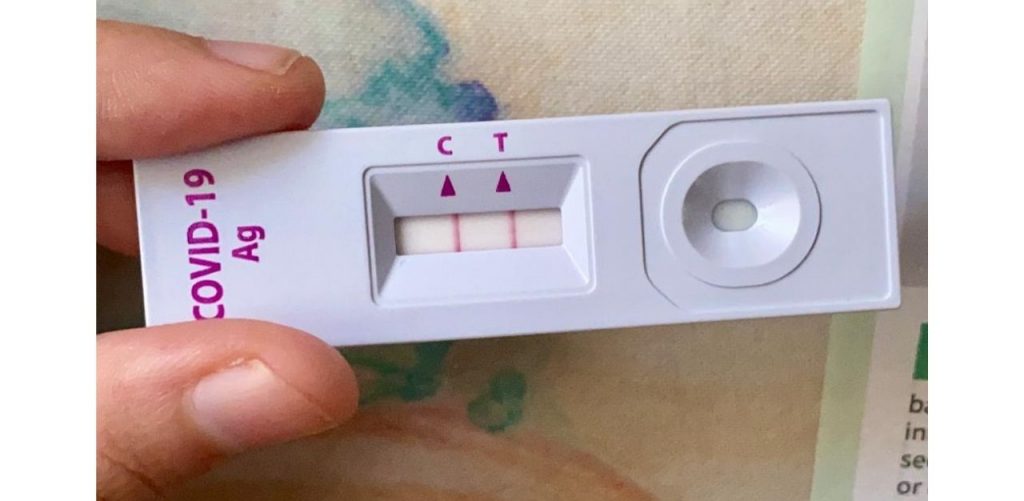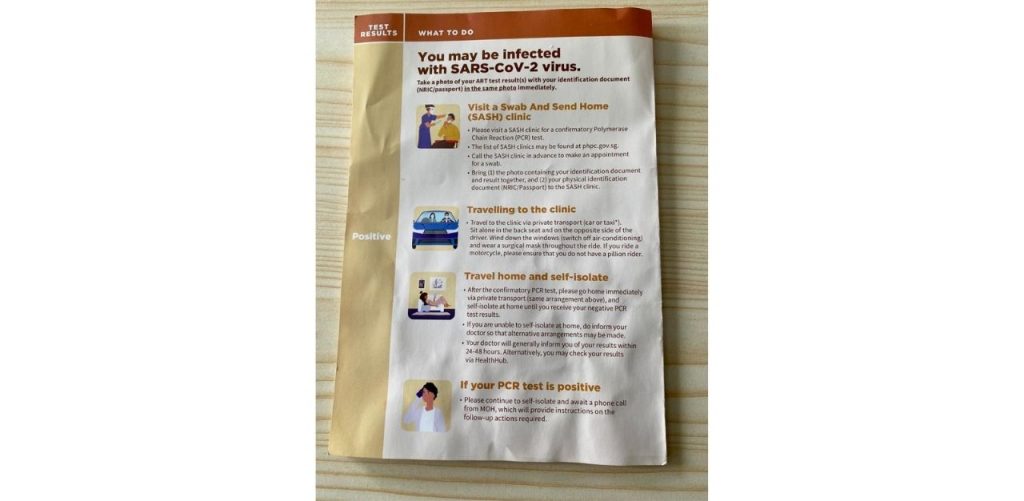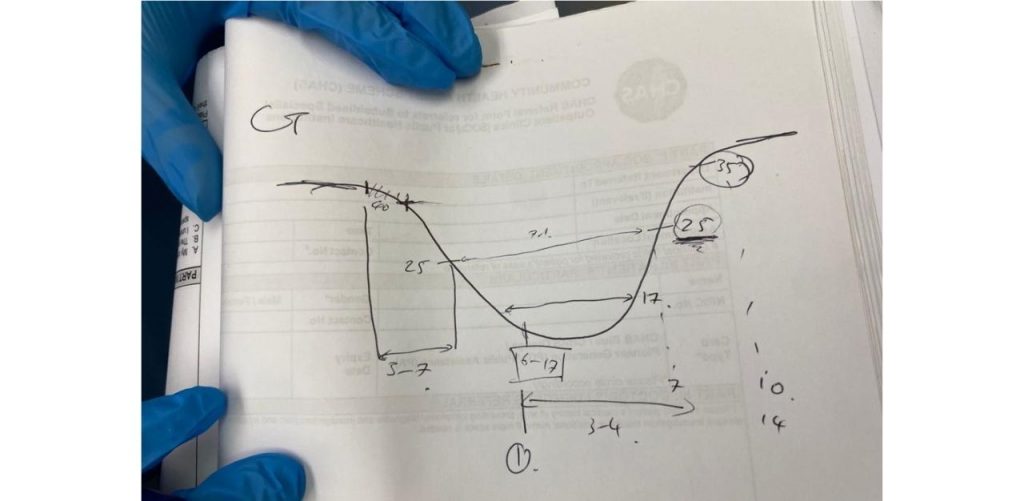It started out with a very deep, persistent cough. I have not had a cough that reverberated through my being like this in years.
Suspecting the worst, I took an Antigen Rapid Test (ART). It first came back negative. By the next morning, my intuition proved me right. My symptoms started showing, so I took a second ART and on 16 November 2021, I officially contracted Covid-19.
I guess I should not be surprised or horrified. At this point, there were 267,150 cases in our population of about 5.9 million people. I am but one of them. That is almost 1 in 20 people, and I believe this number is only going to keep rising.

The first thing I did was inform my mother, who was still blissfully asleep.
“Mi, I got Covid!” I shouted as I dramatically waved my positive test at her, at a distance from her bedroom, of course.
“Oh…do you know, the lions at the zoo got Covid too?” I figured she was still dreaming and sleep-talking.
“Ya I know, but that’s not the point! I got Covid!” I shouted.
My mother suddenly sat up, and I could see the realisation dawned on her face. It was not funny at all, but the whole experience was so bizarre and surreal that I actually laughed.
Remind me again, what is the current protocol?
I needed to know what to do next so I went online to consult the Ministry of Health (MOH) website but it directed me from one link to another, yet my questions were not answered.
For example, under the “I’m not sure what to do” section, I was told that I should visit a Swab and Stay Home (SASH) clinic by private transport.
Now, if I booked a ride, would I not risk infecting the driver, who is a frontliner in his own right? Many of these drivers belong to the older demographic, and the health repercussions would have been much higher for them.
Public transport was certainly out of the question. Although the nearest SASH clinic was within walking distance from my home, by that point my symptoms had already started to make me feel faint and dizzy.
It was also not clear how long I was to wait before I could see the doctor. Was it even mandatory to get a polymerase chain reaction (PCR) test, or could I just begin my self-regulated 10-day quarantine right away?
The MOH website did not “answer” my questions so I called my nearest polyclinic. The woman on the other side of the line was almost as lost as me. She actually thought it was okay for me to take public transport.
She then redirected me to her colleague at the administrative desk, whose answers mainly fell into the category of, “I can’t help you with that, ma’am. For that answer, you would have to call MOH”.
The MOH hotline is mainly manned by bureaucratic operators and operated through button-pushing exercises — the first few of which came before I got to select my desired language. I could just imagine how the dialect-speaking elderly would feel and I am sure they would be ten times more lost than me.
Incidentally, I was told that the hotline was “experiencing high call volume”, and being anxious for answers I eventually hung up before I actually got to speak to an actual human being. I had waited on the line, listening to the same message for almost 20 minutes.
I tried calling several nearby SASH clinics and I only got as far as a dial tone.

While all of this was frustrating and the natural thing to do would be to point fingers; in truth, I could not bring myself to blame anyone, but perhaps the processes. It became clear to me then that the Singapore healthcare system is swamped and that our healthcare professionals are just as disoriented and exhausted with the constant calls, the never-ending questions and the ever-changing protocols as the rest of us continue to be.
From 10 October, the home recovery scheme is the default mode of care for fully vaccinated Covid-19 cases. The move was to offload some of the burden on our healthcare workers. Even then the administrative support staff continue to scramble for cohesion and efficiency to catch up with the chaos.
Many of us kiasi (Hokkien for afraid of death) Singaporeans are still clinging to our political leaders and doctors for answers, desperate for even a sliver of security. But the truth is no one has ever experienced anything like this in our lifetime.
Nevertheless, my experience had some redeeming moments. When I finally got through to my nearest SASH clinic, I could tell the woman at the other end of the line had been dealing with enquiries like mine for months. She got her answers down to a tee.
It was only through her that I learnt it was mandatory for me to get a PCR test, and the earlier I was served my Quarantine Order (QO), the earlier it would end.
When I finally saw a doctor at the SASH clinic, the consultation and what seemed an endless amount of medication for cough, runny nose, and fever only cost me 10 dollars. If I had needed more, teleconsultations would be made available to me, and the medications mailed within the same day. All of this was quick and painless — once the information was made known.

Could a template of the information not be provided to those serving the already panicky people who tested positive for Covid-19 and are seeking the next steps?
My ten-day tango with the virus
The next ten days were like taking a surreal trip through the newly renovated Haw Par Villa. It actually felt like I went through the different levels of hell and back, both physically and mentally.
Perhaps the worst was when fever descended on me in the first couple of days. It felt like my body was heating up for the very first time. I was experiencing the flush as if it was a new thing and the alarm bells within were sound.
Of all the symptoms, I found the loss of my ability to smell the most trippy. It came as a silent sudden realisation, when I was showering and couldn’t smell the fragrance of my soap.
The fever floored me and I felt tired all the time. I basically hibernated the days away while trying to keep my very concerned mother at bay while she tried to ply me with endearing glasses of “miracle barley water”.
Taking my morning ART-tests quickly became a routine. In fact, it became a little game I anticipated every day.
I celebrated in my own little way on day three as my symptoms started receding. But the worst part of contracting the disease was feeling “more isolated than isolation itself”. For seven days, I could not even speak to my mother face to face for fear of passing it on to her.
Finally on day five, only one little line showed up clearly instead of two. I was overjoyed. In the words of Health Minister Ong Ye Kung, I no longer tiok (Hokkien for get) the infection.
Covid-19 served up a fancy cocktail of emotions straight into the confines of my cozy bedroom. Even the power of Netlflix was not enough to distract me from them.
Dread kept me company when I first tested positive.
Confusion arrived shortly to take over and never left as fever and fatigue swung by to stay beside me for the next seven days as I slept. They kept my eyes sore so that I could not watch my favourite show or keep up with the latest on my phone.
Relief made several cameo appearances while I was dealing with the authorities, trying to do the right thing and not unknowingly spread the germs. I have to say a part of me was happy since I no longer had to deal with the uncertainty of when I was going to be infected by the Covid-19 virus, or wondering if the person who just coughed next to me on the bus just passed me the infection.
Guilt hung around throughout, rearing its head once in a while. Even after I have recovered, there’s still that element of blame or shame associated with contracting the coronavirus.
Some of my loved ones said it was because I “didn’t sanitise my hands enough” or “went out too much”.
I did go out but only five times in the two weeks before I fell sick, which I personally felt was reasonable. It was also necessary to maintain other aspects of my health — such as exercise, social interactions, and getting that minimal dose of Vitamin D from the sun.
At a point when the virus did its number on my body, the last thing I wanted was to feel like I deserved getting infected. Even some doctors and nurses, who were properly protected by their personal protective equipment (PPE) also somehow were infected.
If we want to treat Covid-19 as endemic, then we need to start normalising people around us getting Covid-19 too. It would be as random as stepping into dog poo on the street.
Of course, I texted the people I met face to face the two weeks before my infection. It was the responsible thing to do. Many of them did not have Work From Home (WFH) arrangements and had to take ARTs on a daily basis. None of them were positive.
I still do not know where or from whom I got infected. In hindsight, I think that was for the best, or the blame game would never end.
Even after I had recovered, I could not help but feel I am still being shunned, even by a friend who met me that very weekend. She was more concerned about being potentially exposed than whether I was doing okay.
To sum my experience, getting Covid-19 sucks, so try your best not to get infected. But if you do, go easy on yourself.
To those who sometimes joke about going out of your way to get it, don’t! The effects of long Covid have still not been studied and believe me, getting Covid may not be a walk in the park for you, as some people make it out to be. It has been almost two weeks since I tested ART-negative, and I am still coughing and I continue to feel tired.
Whatever it is, please take care and stay safe, everyone!
Join the conversations on TheHomeGround Asia’s Facebook and Instagram, and get the latest updates via Telegram.














